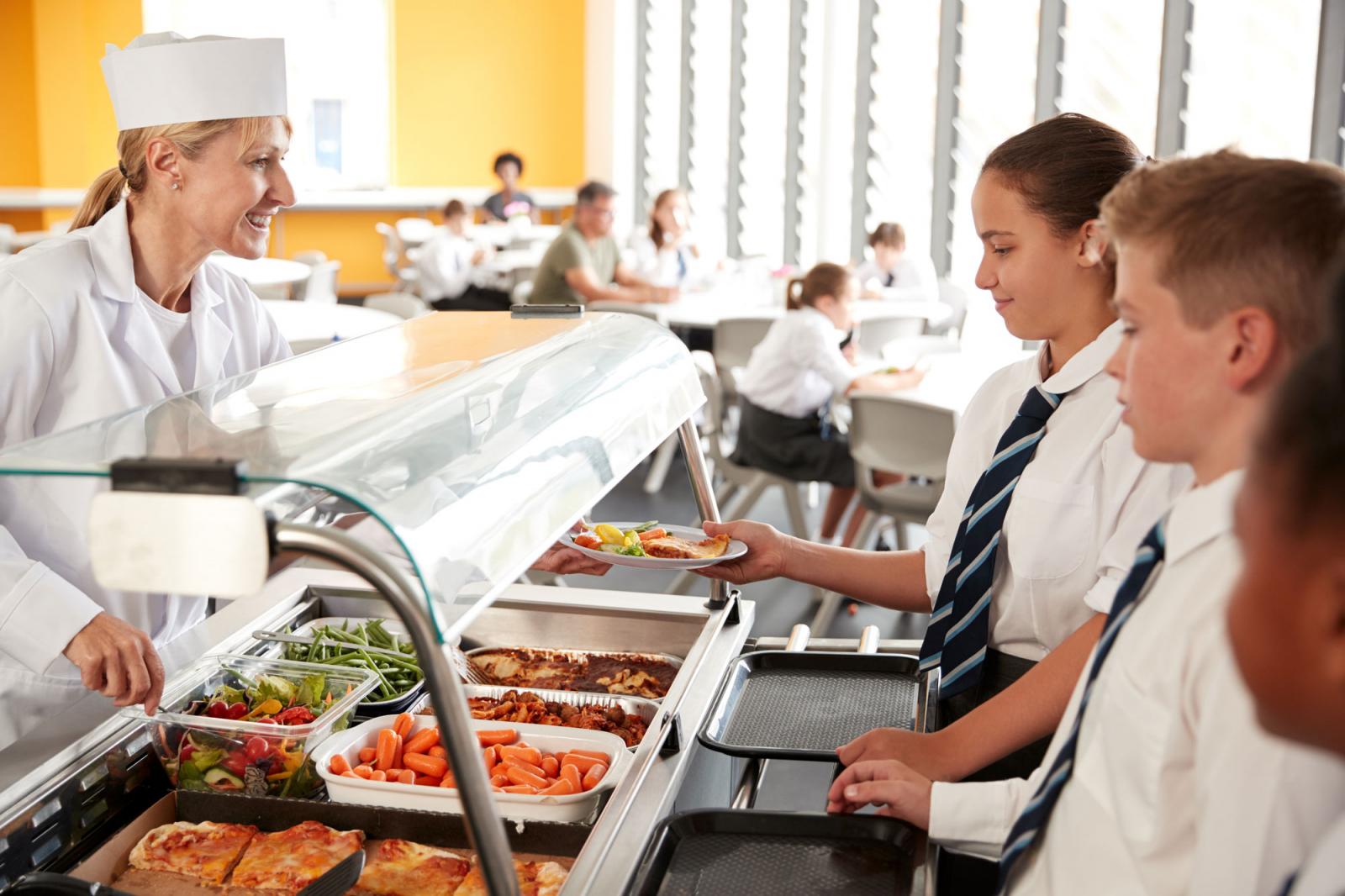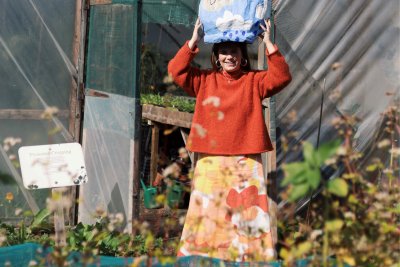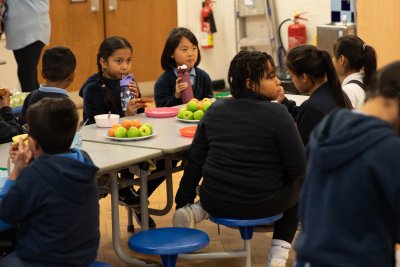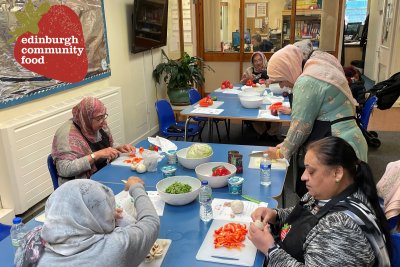Blogs • Children's Food Campaign
National School Meals Week: every child has a right to healthy hot meals
It's National School Meals Week from 8-12 November, with the aim of bringing healthy hot meals to more children. However, over a million children continue to miss out on free meals. In this blog, Barbara Crowther discusses the issues.

National School Meals Week has kicked off, with schools across the UK celebrating and innovating in a range of challenges under the theme "School Tucker Trial".
As National School Meals Week takes place during the COP26 Climate Summit in Glasgow, it's no surprise that better food for the planet, as well as for children's health, is high on the agenda of topics to explore. Challenges include 'Mix-it-up Monday' and Plant-based Power Lunches, aimed at both increasing children's fruit and vegetable intake and a lower carbon impact. Despite all the campaigns and initiaitives aimed at getting us all eating our 5-A-Day, not least Veg Power run by partners in Peas Please, or local Veg Cities, or the School Fruit and Vegetable Scheme (in England), fruit and vegetable consumption remains lower than it should be. On average 11-18 year olds eat just 2.8 portions of fruit and vegetables a day according to the National Diet and Nutrition Survey 2020.
The Biggest Tucker Trial of All
However, the biggest "tucker trial" of all is experienced by more than 1 million children who come from low-income or food insecure households who are still not eligible for free school meals. According to the Child Poverty Action Group, there are around 4.3 million children in the UK living in poverty, equivalent to 9 in every classroom of 30.
A recent BBC report from a day spent with a community foodbank in Stalybridge reported the continued crisis being experienced by many families with children. Foodbank founder Steve Barton shared concerns about running out of food stocks in the midst of rising demand whilst "parents cry because they can't provide food" for their kids. Whilst recent Government ministers argued during parliamentary debates that it was not the job of schools to feed children, the reality is that all over our nations, headteachers and schools are stepping up every day to respond to the need they are witnessing. Buckton Vale Primary School headteacher Deborah Brown, who featured in the BBC's moving short news film, says "Schools are in my opinion becoming hubs, we are the place that families will visit for support. That adds significant pressure on staff. There needs to be an increase in the eligibility threshold for free school meals."
According to the National Food Strategy, nearly 50% of children experiencing food insecurity are not eligible for free school meals due to the very low income threshold of £7400 in order to qualify. It recommended that the threshold be raised to at least £20,000 per annum, a call that the #EndChildFoodPoverty campaign lobbied MPs and Government ministers to adopt as a necessary first step to ensuring no child goes hungry.
However, in the recent Comprehensive Spending Review, whilst the Government committed to continue funding the Holiday Activities and Food programme at national scale, no change was made to free school meal eligibility, either in term time or holidays, so children will continue to fall through the food safety net.
In receiving his MBE for his services to children, Marcus Rashford has vowed to keep campaigning. So are we all. Like many of our partners working in the field of school food, the Children's Food Campaign has joined calls to Government for a full review of the complicated, fragmented school food system, including its funding and eligibility criteria. Our long term vision is one in which a healthy school meal is provided to every child who wants one, without discrimination.
The universal school food tide is turning
Our universal vision for school food is not a pipe dream, but one that is increasingly starting to become a reality around the world as well as closer to home, especially as countries look to build back better from the Covid pandemic. There is a growing body of evidence that well-designed healthy school food programmes can act as a cost-effective investment in children's overall wellbeing and long term economic contribution.
Before the pandemic struck at the start of 2020, it's estimated that schools around the world were feeding more children than at any other point in human history. In England and Scotland, Universal Infant Free School Meals (UIFSM) have been provided since September 2014, whilst in Wales a free breakfast is provided to every primary school pupil. During the 2021/22 academic year, Scotland is going a step further in rolling out that universal provision to provide both breakfast and lunch to all primary age pupils by August 2022, as well as longer term exploring further expansion of secondary school food offers. Expanding primary school meals is not without its logistical challenges, especially given recent supply chain disruptions with deliveries, food worker shortages and food price inflation, as well as the school-based infrastructure adaptation required. Notably, the Scottish Conservative Party's 2020 decision to include free primary school breakfasts and lunches in its election manifesto opened up the opportunity of a consensus that set aside traditional party politics in pursuit of a policy that is right for children's health, welfare and inclusion.
At a more local scale, at a webinar on universal school food approaches hosted by the Children's Food Campaign earlier this year, the London Borough of Newham explained its approach. Newham is one of four London Boroughs who are currently funding delivery of free school meals to all primary pupils, under its Eat For Free initiative, which saw uptake of school meals rise from 45% before introduction to over 90% today. The additional borough-wide investment requires all food served to be accredited as a minimum to the Bronze Level Food For Life scheme (run by the Soil Association), ensuring healthy, local and sustainable food is served. It has also stimulated a local economic benefit, with an increase in jobs to provide for the additional uptake, all paid at Living Wage, and 86% of employees resident in the borough.
Globally, momentum on school food is growing. A new international School Meals Coalition, convened under the auspices of the UN's World Food Programme, is bringing together nations who share the aim that every child has access to a healthy school meal by 2030. It's also gathering data and evidence of its impact in reducing inequalities, both locally and globally. The coalition already has 61 country signatories, including France, Finland, USA and Germany as well as from countries across Africa, Asia and Latin America. Whether England, Scotland, Wales or Northern Ireland will sign up their support is something we should be asking our MPs to raise on our behalf.
On Thursday 16 November, the Scottish Poverty and Inequality Research Unit (SPIRU) is hosting an international webinar exploring lessons from the introduction of universal free school meals in Scottish primary schools, as well as expansion of meal provision in other countries. You can register at this link.
We believe it is time to change the narrative about free school meals. We do not conduct means testing of children when they use the school library or join the PE lesson. Nor do we only feed children in hospital if their parents earn below an income threshold. We know that food is essential to children's ability to concentrate and learn, and yet we still apply a totally different logic to integrating school food for all into the core fabric of provision. Why?
This National School Meals Week, let's all celebrate the good food our schools provide for children (and continue to demand better where it's not good enough too). Let's all celebrate and thank the teachers, catering staff, suppliers and food producers who put food on our children's plates in school each day, and also make sure all these workers are paid a fair and living wage. And let's all 'be more Marcus' and keep campaigning until all children in our schools can enjoy the same healthy and nutritious food, without any discrimination.
Published Tuesday 9 November 2021
Children's Food Campaign: Better food and food teaching for children in schools, and protection of children from junk food marketing are the aims of Sustain's high-profile Children's Food Campaign. We also want clear food labelling that can be understood by everyone, including children.





